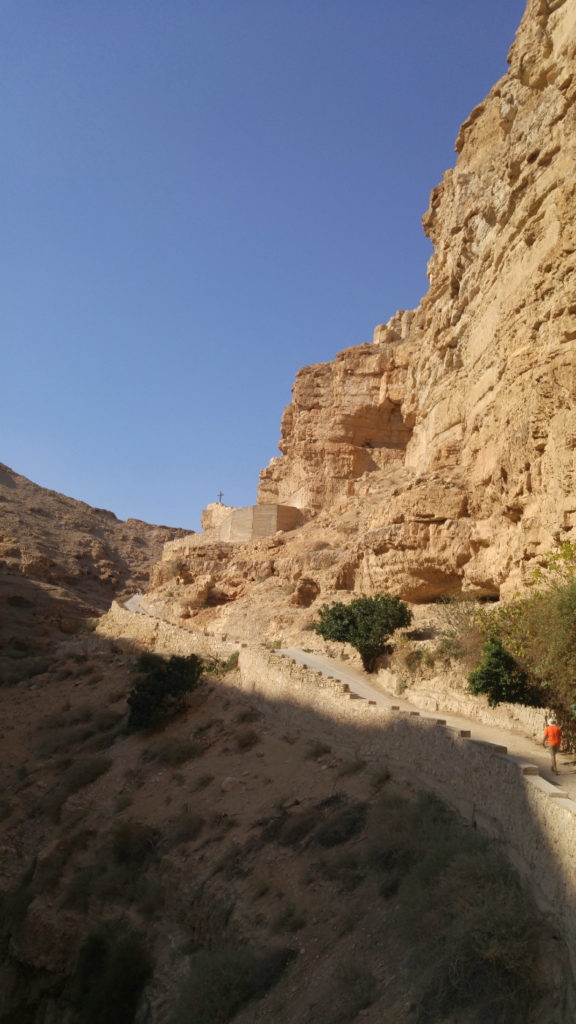The picture you see at the heading of this post is the familiar “road to Jericho” we walked during our time in Israel back in June. Contrary to Jesus’ parable of the good Samaritan where “a man went down from Jerusalem to Jericho”, our leader opted to take us up from Jericho to Jerusalem. We met many other (often Christian) groups along the way as we traversed the narrow, windy, upward path, and nearly every group we met said the same thing: “you’re going the wrong way”. As we got towards the end of this trek, I understood why. These other 2 pictures show the steep short incline we had to go up at the final stage of our journey after having already hiked about an hour and a half in the 38ºC desert heat.

The view from the bottom …

The view from the top – notice the road on the other side at the bottom …
Most groups (if not all) who travel this road in a Biblical tour do as the parable states: they go down. But we were bucking the trend; going against the grain. But why? As we learned and lived often during our time in the Middle East, the journey of a disciple is not only often contrary to the prevailing winds, it is also almost always up. In all the Bible, God’s people never go down to meet him, they always go up. Only God comes down to us (ultimately in the person of Jesus Christ). Going up is hard work, but in the end is well worth it. Going up also leads to and requires sacrifice (hence why sacrifices were offered in high places in the OT). This is part of the summons when Jesus says “follow me”. We saw this played out in the familiar story of the young man in Matthew 19 this past Sunday morning.
Without knowing that this young man is wealthy, we see at first that he has an earnest desire to please God with his life and a seeming ability to live that life. This is evident in his question “what good thing must I do to get eternal life?” Jesus, loving this young man (see Mark 10:21), goes along with his question, in the process, helping the young man to see the error in his question. “Keep the commandments” says Jesus. “Which ones?” asks the young man. Here, already, we see the chink in the young man’s armour: ‘perhaps Jesus will justify my way of life … perhaps he will list the commands I believe are most important’. Jesus predictably quotes the latter half of the 10 Commandments plus Leviticus 19:18. But we might notice there are 2 glaring omissions in this “do not covet” (the 10thcommandment), and the first 4 commandments, especially the first 2 about serving God alone and not worshipping idols. The young man, although he could have walked away satisfied on this point, still acknowledges his “lack”. To which Jesus provides the gut-wrenching response to him – the very thing he did not want to hear: “If you want to be perfect, go, sell your possessions and give to the poor, and you will have treasure in heaven. Then come, follow me”. Jesus puts his finger on the problem of this young man’s lack: he could not part with his wealth. The young man was asking the wrong question: “what do I need to do?” When the real questions should have been “who do I need to follow?”
All throughout the Bible we see that God is not concerned with our outward actions, but the condition of our hearts. Jesus elsewhere tells us “where your treasure is, there your heart will be also.” This young man, like so many other people throughout history, wanted the Kingdom without the King; he wanted the benefits of Jesus without having Jesus himself. The cost of following Jesus for this man was too much. His question “what do I need to do?” Is one that resonates with us, and one we’d often rather ask than “who do I need to follow?” Doing is easier to manage. In a results-oriented society, it is easier to point to as a means of quantifying and qualifying our level of piety. It also enables us to keep God at arms’-length, so as to protect ourselves from any “outlandish” demands like Jesus makes of this young man. It has often been said of this particular verse “those who want to argue that this command only applies to this young man are likely exactly the kind of people for whom this command applies”. True, it is not limited to our wealth, but there is much that accompanies the affluence of our society that crowds out the commands of Jesus and the demands of discipleship to him. Jesus could equally, to you or I, say any of the following:
- Give up your busy schedule …
- Give up your smart phone …
- Give up your Playstation/Xbox …
- Give up your boyfriend/girlfriend (not spouse – see its absence from Matthew 19:29) …
- Give up your job …
- Give up … anything that is getting in the way of your relationship to God …
And FOLLOW ME
That is Jesus’ invitation to all of us. Will we accept it? There is great sacrifice and hard work, but it is well worth it.
Homework
Throughout this week, read over Matthew 19:16-30 at least 2 times and ask the following questions:
- What is it saying to me? What jumps out at me from this passage? Why?
- Is there anything that I would not give up if Jesus asked me to do it?
- Confess that thing to God
- Ask him for help to dislodge that idol from your life
- If you sincerely believe there is nothing you wouldn’t give up for Jesus’ sake, then ask yourself ‘Is it more important for me to do what is right than to be in right relationship to God?’
- Pray for God to draw near to you as you draw near to him
- Ask him to help you find ways to cultivate a deeper relationship to him

